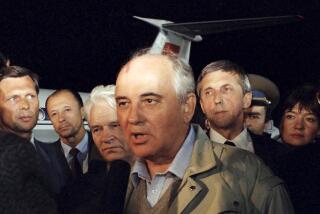Dubcek Likens Soviet Plan to ‘Prague Spring’
- Share via
ROME — Alexander Dubcek was quoted Saturday as saying the reforms promoted by Soviet leader Mikhail S. Gorbachev are similar to his own efforts during the “Prague Spring” that was crushed by a Warsaw Pact invasion in 1968.
Dubcek, the former Communist Party leader in Czechoslovakia, commented in an interview with the Italian Communist Party daily L’Unita to be published today. Excerpts were released Saturday.
It is the first interview Dubcek has given to a Western publication since being expelled from the Communist Party in June, 1970.
“ Perestroika (restructuring) is indispensable and I support it because I find in it a strong connection with what we were confronted with 20 years ago,” he told the newspaper.
Gorbachev has promoted economic reforms under the term perestroika , which provides for more incentive for workers and less centralization.
Dubcek, now 66, was ousted as party leader in April, 1969, by Gustav Husak after the Soviet-led invasion in August, 1968, crushed the “Prague Spring” reforms. Dubcek’s intention was to create “socialism with a human face” by fostering freedom of expression and a degree of pluralism.
Dubcek served briefly as ambassador to Turkey after his ouster, but was then sent into political obscurity in his native Bratislava.
He described himself as a “prison inmate on a controlled walk in a limited space. . . . I was made to understand in every way that I am on the outside.”
Husak was replaced as party leader last month by Milos Jakes. The Czechoslovak leadership has adopted the language of Gorbachev’s reform but so far has only outlined plans for some decentralization of the planned economy, skirting political changes.
Dubcek told L’Unita he has “sincere, loyal and unequivocal” backing for Gorbachev’s efforts.
“I think that time has been lost,” Dubcek was quoted as saying. “I think of what could have been achieved in all these years with the new course, of the advantages there would have been for our country, for socialism.
“Those new tasks that we proposed in 1968, that we publicly discussed and then carried out could today prove the smoothest way to overcome the divisions in society and in the party.”
He added: “One cannot make an automatic comparison between our 1968 (reforms) and perestroika . But time has shown there are similarities here and there between the fundamental sources of inspiration. . . Not an identity, but a notable similarity links the original concepts and ideas.”
‘Acts Are Decisive’
Asked about the reform ideas of the current Czechoslovak leadership, Dubcek was quoted as saying, “These are words to be judged positively, but concrete acts are decisive.”
Dubcek said he had no regrets over his own reform movement. “In good conscience, looking back to 1968 I can assert that our politics won over the Czechoslovak people,” he said.
The Czechoslovak party daily Rude Pravo sharply attacked Dubcek last Monday, blaming him for allowing the 1968 reforms to get out of control. The paper denied any link between those changes and current Soviet-style reforms.
L’Unita said it sent written questions to Dubcek seven months ago, and the answers, covering more than 50 pages, were sent back in November. Deputy editor Renzo Foa went to Czechoslovakia in December and conducted further face-to-face interviews.
Dubcek is believed to favor communication with Italian Communists because he sees them as being closest to the politics he supports.
More to Read
Sign up for Essential California
The most important California stories and recommendations in your inbox every morning.
You may occasionally receive promotional content from the Los Angeles Times.











